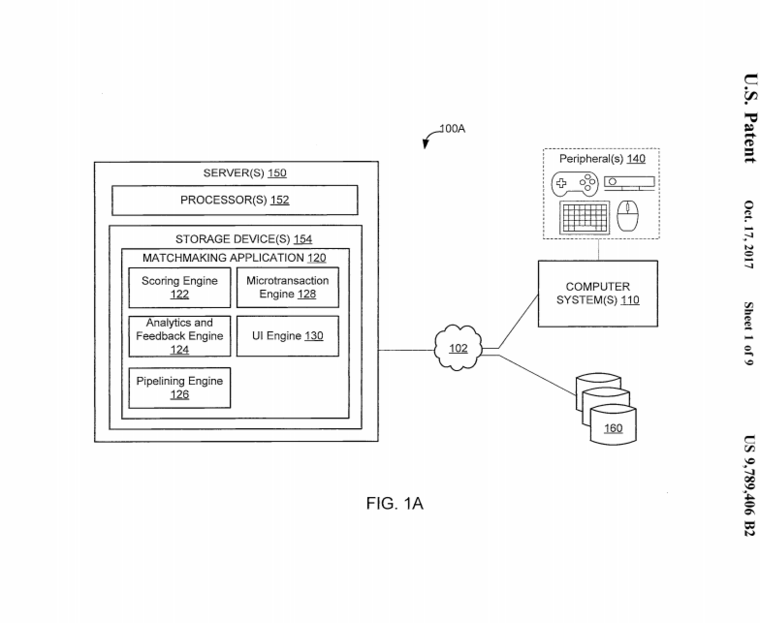Update #3:
Fixed the headline to reflect that Activision has not and is not currently using the matchmaking algorithm to influence people to buy DLC as per the official statement.
Update #2:
An Activision spokesperson has responded to us and has given a statement below.
This was an exploratory patent filed in 2015 by an R&D team working independently from our game studios. It has not been implemented in-game.
There you go, then. This is good news, right?
Update:
Bungie’s Community Manager DeeJ has gone on record on Twitter to say that this functionality doesn’t appear in Destiny 2, which is good to hear.
None of this functionality appears in Destiny. https://t.co/IXlR05tZ1c
— DeeJ (@DeeJ_BNG) October 17, 2017
Original Story:
Have you ever played a game of Call of Duty online and noticed you were going up against people with weapons that can only be obtained via Suppl Drops? If so, it’s not you, but the game is designed to act that way. It seems Activision is using a matchmaking system to influence gamers to cough up dough for microtransactions!
The patent, which was filed at the USPTO (US Patent and Trademark Office) in 2015 was only approved on October 17. Unearthed by Rolling Stone, some of the tricks the matchmaking does is by having lower-skilled players matched up against higher-skilled ones to encourage the lower skilled players to spend money to get better in-game items so they can match up better against higher skilled players.
For example, in one implementation, the system may include a microtransaction engine that arranges matches to influence game-related purchases. For instance, the microtransaction engine may match a more expert/marquee player with a junior player to encourage the junior player to make game-related purchases of items possessed/used by the marquee player. A junior player may wish to emulate the marquee player by obtaining weapons or other items used by the marquee player.
Additionally, Activision influences gamers to buy microtransactions by checking their player profile. One example given is how a player who has expressed interest in sniping might be matched up against high-skilled snipers in the game to encourage them to buy an in-game sniper rifle, or other items used by the same player.
In a particular example, the junior player may wish to become an expert sniper in a game (e.g., as determined from the player profile). The microtransaction engine may match the junior player with a player that is a highly skilled sniper in the game. In this manner, the junior player may be encouraged to make game-related purchases such as a rifle or other item used by the marquee player.
The patent also reveals that Activsion may match players to those who own a DLC item with those who don’t have it in order to encourage players who don’t own the item to purchase them. That’s not all, Activision’s patent can also make players who bought a DLC item to feel good about their purchase by putting them into matches that highlights the power of the DLC item, which might lead the player to buy more in-game stuff due feeling the purchase was worth it.
Microtransaction engine 128 may analyze various items used by marquee players and, if at least one of the items is currently being offered for sale (with or without a promotion), match the marquee player with another player (e.g., a junior player) that does not use or own the item. Similarly, microtransaction engine 128 may identify items offered for sale, identify marquee players that use or possess those items, and match the marquee players with other players who do not use or possess those items. In this manner, microtransaction engine 128 may leverage the matchmaking abilities described herein to influence purchase decisions for game-related purchases.
In an implementation, when a player makes a game-related purchase, microtransaction engine 128 may encourage future purchases by matching the player (e.g., using matchmaking described herein) in a gameplay session that will utilize the game-related purchase. Doing so may enhance a level of enjoyment by the player for the game-related purchase, which may encourage future purchases. For example, if the player purchased a particular weapon, microtransaction engine 128 may match the player in a gameplay session in which the particular weapon is highly effective, giving the player an impression that the particular weapon was a good purchase. This may encourage the player to make future purchases to achieve similar gameplay results.
The patent mentions that the examples used are for first-person shooters, but the matchmaking system can be used across different games. Rolling Stone has reached out to Activision to check which games are using this system currently, but based on the info we have so far, it might not be a stretch to say that Call of Duty is the #1 culprit when it comes to the matchmaking “tricks.”
Call of Duty: Black Ops 2 was the first game in the franchise to house microtransactions, but starting in 2014 with Advanced Warfare, Activision introduced the Supply Drop system which gives random content (including Supply Drop-exclusive weapons) in exchange for in-game currency that can also be bought by real-world money.
We’ve also reached out to Activision and will update the post if and when we get a response.
Source: Rolling Stone via CharlieIntel
